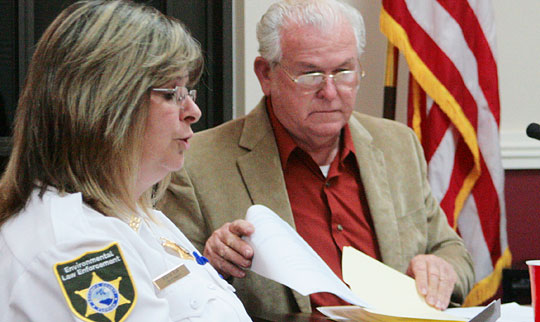Escambia’s Top High School Seniors Are Honored
April 15, 2011
Escambia County’s top seniors were honored Thursday night at the 2001 Senior Academic Awards at the Mustin Beach Officers’ Club.
The banquet was sponsored by the Escambia County Public Schools Foundation and Kerrigan, Estess, Rankin, McLeod and Thompson.
Recipients were:
Northview High School
Ashley E. Digmon
LaNeicia D. Gomez
Jocelyn M. Gould
Sarah Malinda Killam
Emily F. Vickrey
Mallory Ann Bell
Christina N. Sepulveda
Colton Sims
James Tyler Garrett
Hayley Renee Simpson
Allyson M. Bullard
Tate High School
Caitlyn Nicole Gallagher
Michael Todd Lowery
Kimberly Noelle McCroan
Caroline Marie Merritt
Shawna Rachelle Murphy
Jessica Lee Mack
Denis Alex McKinnon III
Kelly Hendricks Ewing
Christopher Taylor McKeon
Bryan Jeffrey Rhodes
Kristyn Alyse Covotta
West Florida High School
Hieu Chau
Rocio Gomez Novo
Daniel L. Grenier
Stephanie M. Hayley
Matthew O’Rear
John P. Ansardi, Jr.
Nicholas Dolan Rivers
Benjamin Parrish
James Sidney Clements III
Hannah Pate
Miranda Bjorklund
Pine Forest High
Sirikanya Sellers
Kristen Lassen
Nicole Scully
Krista MacMurray
Hillare’ LaFond
Joseph Mills
Kristi Spatter
Michael Core
T’Kara Mullins
Austin Williams
James Wood
Escambia High School
Hannah Bergstrom
Brianna Biggs
Jeff Cutaio
Khoa Cao Dang
Shawn Patrick Reid
Brandon Mejias
Jessica Reed
Raymond Tu
Anthony J. Bushey
Alexanderia Newman
Erick Hudson, II
Pensacola High School
Ivory Leonard
Edith Licona
John Michael Morales
Henry Nguyen
Sandy Nguyen
Uniqua Monae Rogers
Indy Daigle
Yu Ting Zheng
Christian Bulosan
Diana Nguyen
Aleitha Smith
Pensacola High IB Program
Jemimah Chen
Priya Garg
Nathan Prasad Gupta
Fareed Rifai
Julie Phuong Vu
Samantha Paedae
Nick Feroce
Kay Li
Michael Brusoski
Jamie Landa
Angela Joy Menah
Washington High School
Thomas Campbell Arnold
Tam Mai
Diana M. Manis
Shannon Robinson
Michael Cleveland Stavely
Aryn Bradley
Bradley Leon
Alex Goodspeed
Lindsey Shaw
Matthew Horne
Parvina A. Kudyakova
National Merit Finalists
Andrew Clark
Melody Dalton
Helie Dharia
Priya Garg
Nathan Gupta
Kay Li
Julie Vu
Savannah Wing
Northview JV Downs Flomaton
April 15, 2011
 The junior varsity Northview Chiefs ended their season Thursday with a win over the Flomaton Hurricanes. Northview beat the ‘Canes 9-5 to end their season at 14-3.
The junior varsity Northview Chiefs ended their season Thursday with a win over the Flomaton Hurricanes. Northview beat the ‘Canes 9-5 to end their season at 14-3.
Jay Relay For Life Begins Tonight
April 15, 2011
 The annual Relay for Life begins at 6:00 tonight in Jay.
The annual Relay for Life begins at 6:00 tonight in Jay.
Thirteen teams with about 230 participants will take part in the event at Jay High School.
Teams include: Cancer Patrol, Duramed, Duramed Kids, EREC, Jay Hospital, Jay High Royals, Jay Medical, Jay United Methodist Church, Mt. Carmel United Methodist Church, Purple Power, Quantum Leapers and Training Wheels.
The public is invited to stop by the all night event at Jay High.
School Prayer Bill Clears First Hurdle
April 15, 2011
A bill permitting prayers at school events such as graduations or assemblies cleared the Senate Education Pre-K-12 Committee on a unanimous vote Thursday.
The bill sponsored by Sen. Gary Siplin, D-Orlando allows school districts to adopt policies regarding the “delivery of inspirational messages, including prayers” at graduation ceremonies or other “noncompulsory student assemblies.”
Only students could deliver the prayers and the language must be nonsectarian, the bill says.
David Barkey, an attorney with the Anti-Defamation League, said the specificity of the bill, including the use of the word “prayer” violates state and federal constitutional requirements that prohibit the endorsement of one religious philosophy by the government. And by stipulating what can be said in a prayer, that would require school involvement to police it, Barkey said.
Even with the nod from the Senate committee, the bill’s future is murky. A similar bill in the House has not yet been heard by a single committee.
By The News Service of Florida
Education Savings Account Bill Moves Forward
April 15, 2011
A bold plan to allow parents to use state funding to pay for private school tuition, college savings plans, or tutoring cleared its first committee on Thursday.
The ambitious plan (SB 1550) would take 40 percent of the state’s per-pupil spending on a public school student and deposit it into an account – the bill calls it an “education savings account” – where it may be used to pay private school tuition, for tutors, or for college savings accounts.
That would amount to about $3,100 per student under this year’s education funding formula.
 “This is a very innovative program that recognizes that parents should have choices,” said Sen. Joe Negron, R-Stuart, the bill sponsor. He added that “I don’t believe public schools are going to fold” because of the bill. “Public schools are competing with private schools,” Negron said.
“This is a very innovative program that recognizes that parents should have choices,” said Sen. Joe Negron, R-Stuart, the bill sponsor. He added that “I don’t believe public schools are going to fold” because of the bill. “Public schools are competing with private schools,” Negron said.
Any student, whether they currently attend public or private school, would be eligible to open an account.
Gov. Rick Scott has previously stated his support for savings account plans for parents, and the idea is supported by an education policy group founded by former Gov. Jeb Bush.
Though the bill cleared the Senate Education Pre-K-12 Committee on Tuesday, supporters and detractors alike said it isn’t likely to progress much further.
Its House companion (HB 1225) has not yet been heard in a committee.
“It won’t get much further this year,” said Jaryn Emhof, a spokeswoman for the Foundation for Florida’s Future, the education think tank affiliated with Bush that is pushing various proposals that would channel more state funding into charter, virtual and private schools. “It was heard as a courtesy.”
Emhof said this is the first year the idea has gotten a hearing in the Legislature and that education savings accounts are likely to return next year for more serious consideration.
Critics say the education savings account bill is just another voucher program. Its unique structure, which doesn’t mandate that taxpayer money go to a private school, may allow the state to skirt around the constitutional issues that have been problematic for school voucher programs in the past.
A previous attempt at a wide-ranging school voucher program called Opportunity Scholarships was struck down in 2006 after the Florida Supreme Court said it violated the state constitution.
“It’s constitutional,” Negron said after the committee. “We do the same thing in voluntary (pre-kindergarten),” Negron said, though the bill analysis says it may be “constitutionally challenged.”
Several teachers spoke against the bill Thursday, saying it is a way of diverting funds away from public schools and into private schools and the hands of parents who home school their children.
“While this might be something that seems like a good idea in theory, in reality if we were to have a large number of people opt into this program…I do see us losing some of our wonderful programs,” said Barbara Wilmarth, a Pinellas County public school teacher.
Negron said it doesn’t hurt public schools. He said the measure would allow schools to keep 20 percent of the state’s per-pupil spending cost, even though the student would be gone, though the bill didn’t spell out that percentage.
But the proposal does provide a strong incentive for parents to take their kids out of public schools, critics say.
“What is to stop families from saying ‘I am going to keep my child home’ and just take the money and it is not going to appropriate educational opportunities?” asked Sen. Lizbeth Benacquisto, R-Fort Myers.
Negron said by requiring the money be deposited into banks and having only certain approved expenditures, such as tuition, books, tutors and college savings plans, would avoid abuse.
The bill would cost the state’s Department of Financial Services over $760,000 to set up, and about $168,541 each year to maintain. The department would be in charge of setting up the savings accounts.
Negron said he was focused on moving the bill forward in the Senate, though acknowledged that “it is a transformational idea and so we are making progress as with any big idea.”
By Lilly Rockwell
The News Service of Florida
Moretz Honored For Core Values
April 15, 2011
 Northview High School junior Melissa Moretz was honored Thursday by the Pensacola Suburban West Rotary Club as Northview’s Core Values Student.
Northview High School junior Melissa Moretz was honored Thursday by the Pensacola Suburban West Rotary Club as Northview’s Core Values Student.
Moretz, along with students from Tate, West Florida, Pine Forest, Escambia and Pensacola high schools received an award and spoke about core values to the PSW Rotary Club Thursday during their meeting at the Pensacola Yacht Club. The students were nominated by the individual schools and chosen by the Rotary members for exhibiting the core values of equality, integrity, patriotism, honesty , responsibility and respect.
The values are stated goals of the Escambia County School District and were adopted and fashioned after a Navy program created by Vice Admiral John H. Fetterman, Jr.
Moretz is the drum major of the Northview High School Tribal Beat Band, executive officer the school’s NJROTC and runs on the track team. She is employed by Lee Veterinary Clinic.
Pictured above: Northview junior Melissa Moretz was honored Thursday by the Pensacola Suburban West Rotary Club as Northview’s Core Values Student. Pictured below: Melissa Moretz with her parents, (far left) Lisa Moretz, James Moretz and (far right) Captain Charlie Code, Northview senior Naval science instructor. Submitted photos for NorthEscambia..com, click to enlarge.
$650K Grant Awarded To Rehabilitate Substandard Housing
April 14, 2011
A $650,000 grant will rehabilitate several substandard houses in one North Escambia community.
 A Community Development Block Grant (CDBG) awarded to the Town of Century will rehabilitate or replace about nine homes that are currently occupied by persons of low or moderate income.
A Community Development Block Grant (CDBG) awarded to the Town of Century will rehabilitate or replace about nine homes that are currently occupied by persons of low or moderate income.
In order to be eligible for the rehabilitation grant assistance, applicants must reside within the corporate limits of Century and meet low income requirements. Applications with the lowest incomes will receive priority in the program.
Persons interested in the grant program must apply by April 28 by stopping by the Century Town Hall between 8:30 a.m. and 3:30 p.m. For more information, call Debbie Nickles at (850) 256-3208.
For complete program information and income requirements, click here.
Escambia Code Officers Could Get Guns
April 14, 2011
Escambia County’s Environmental Code Enforcement officers could soon be carrying guns on job under a plan tentatively approved by county commissioners.
Commissioner Gene Valentino said that code officers could be deputized and carry a weapon, but that idea was not agreeable to his fellow commissioners and Sheriff David Morgan.
 But commissioners voted unanimously to allow code enforcement officers to get a concealed weapons permit in order to care a firearm. The policy will be drafted by the county attorney and set for final approval at future commission meeting.
But commissioners voted unanimously to allow code enforcement officers to get a concealed weapons permit in order to care a firearm. The policy will be drafted by the county attorney and set for final approval at future commission meeting.
The 14 code officers in the county have already been issued bulletproof vests, but the current county policy prohibits firearms on county property or in a county vehicle, except for Sheriff’s deputies.
Escambia County Environmental Code officers enforce and investigate codes, ordinances, state statutes, and administrative code violations committed in Escambia County. They also operate within Century under a joint agreement with the town.
Pictured: Escambia County Code Enforcement Director Sandra Slay addresses the Century Town Council about a problem property in February. NorthEscambia.com file photo, click to enlarge.
Crabtree Church Road Bridge Reopens
April 14, 2011
 The bridge over Alligator Creek on Crabtree Church Road in Molino has reopened.
The bridge over Alligator Creek on Crabtree Church Road in Molino has reopened.
The bridge was closed on March 24 when advanced decay was found in one of the pilings during a routine inspection. DKE Marine made the repairs under an emergency work order.
The bridge on Crabtree Church Road is about halfway between Sunshine Hill Road and Highway 99.
Drug Test For Government Benefits Bills Advance
April 14, 2011
Recipients of temporary financial assistance from the government would have to test negative on drug tests, which they would have to pay for, before collecting their checks under a measure that passed two legislative committees on Wednesday.
Both measures would cost recipients from $10 to $70 per test when they apply for temporary assistance checks of up to $300 a month.
The House version, sponsored by Rep. Jimmie Smith, R-Inverness, was approved Wednesday by the Health and Human Services Committee on a party line vote following brief debate. The Senate Budget Subcommittee on Health and Human Services approved that chamber’s version on a 5-2 vote.
Backers say the proposal would help ensure tax dollars are not being spent to sustain a drug or alcohol addiction while sending a “tough love” message to abusers to get help.
“At the end of the day, I want to help people who want to help themselves,” said Sen. Rene Garcia, R-Hialeah. “It’s only fair to me and my family, who are investing in this state, to make sure this goes to people who really need it. ”
Citing studies showing the degree of drug use among welfare recipients is not significantly higher than that of the general population, critics say the proposal sets unnecessary barriers to getting help for low income families who can least afford it.
“We don’t support illicit behaviors,” said Michael Sheedy, associate director for health at the Florida Catholic Conference. “But to apply this policy without offering a safety net … is not what we need to be doing at this time.”
Both bills would require recipients of benefits under the Temporary Assistance to Needy Families program, to undergo a drug test for controlled substances before being allowed to collect money.
Recipients who test positive for drugs would be ineligible for TANF payments for a year. A second failed test would result in a three years suspension of benefits.
Recipients who complete drug treatment could receive assistance after a six month period. Children would be allowed to continue receiving benefits, with assistance checks being sent to guardians who likewise test negative.
“To be giving these people $300 a month when they have a $25 a day crack habit, the money is not going to get to the family,” said Rep. Paige Kreegel, R-Punta Gorda. “We’re doing nothing but pouring gasoline on an already existing fire.”
Opponents pointed to a study by Florida State University that found such testing programs weren’t cost effective, in part because so few people tested positive.
Further, the loss of temporary assistance to families already under stress will do little to help, said Rep. Mark Pafford, D-West Palm Beach.
“The unintended consequences are going to rip families apart,” Pafford said.
By Michael Peltier
The New Service of Florida


